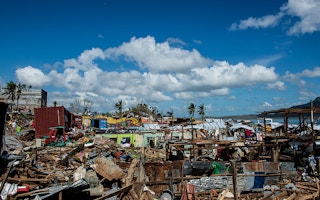The Philippines Commission on Human Rights has announced that it is moving forward with the next steps in the world’s first-ever case against major fossil fuel companies for alleged human rights abuses.
To continue reading, subscribe to Eco‑Business.
There's something for everyone. We offer a range of subscription plans.
- Access our stories and receive our Insights Weekly newsletter with the free EB Member plan.
- Unlock unlimited access to our content and archive with EB Circle.
- Publish your content with EB Premium.
The commission is to take to task oil giants such as Chevron, ExxonMobil, BP, Shell, Total, BHP Billiton, Suncor, and ConocoPhillips for their alleged role in causing death and financial loss on a massive scale as a result of climate-induced disasters in the archipelago.
A month after concluding the first phase of their investigation, which looked at scientific evidence linking climate change and fossil fuel operations, CHR commissioner Roberto Eugenio T. Cadiz, who leads the national investigative body for the case, said they are now ready to push forward with public hearings, beginning in April 2017.
Cadiz said they have secured responses from 20 out of the 47 fossil fuel companies involved in the case as of 8 December.
The responses were either sent to CHR directly or to the Business and Human Rights Resource Center (BHRRC), a New York-based advocacy group that tracks the human rights policies and performance of businesses.
“
The reality of climate change and how it affects human rights has been put in the spotlight, and ultimately, when people stand together and rise above adversity, justice will prevail.
Yeb Sano, executive director, Greenpeace Southeast Asia
In a letter addressed to BHRRC, American company ConocoPhillips, which claims to be the world’s largest independent oil and natural gas exploration and production company, said they challenged the jurisdiction of the legal proceedings arguing that their company does not have operations in the Philippines.
“We operate responsibly and take climate change issues seriously; managing greenhouse gas emissions in our operations and integrating climate-change related activities and goals into our business planning,” Sabrina Watkins, ConocoPhillips’ head of sustainable development, said in the statement.
Repsol, a global energy producer based in Madrid, confirmed in a letter sent to BHRRC on 8 November, that they sent a reply to the CHR but are unable to disclose details due to the confidentiality rules of the government body.
Russian company Lukoil for their part said that they have now developed and are implementing what they call a Biodiversity Protection Program focused on “undoing harm” to marine resources and “reclaiming oil contaminated land.”
The company further said that it has been aiming to prevent water pollution by using “zero pollution” technology in its off-shore operations since 1997. With this technology, not a single item of waste will pass into the water, the company said in a statement.
The CHR said the petitioners would be ready with a consolidated response by 14 February 2017.
“As petitioners, we will continue to advocate for our demands, including an authoritative finding by the CHR that fossil fuel companies must respect human rights and outline steps that would shift their existing business practices away from further contributions to climate change and prevent human rights impacts,” said Rose Trajano, secretary general of the Philippine Alliance of Human Rights Advocates, one of the petitioning organisations.
“As long as companies and governments fail to act on climate change, every day is human rights day. Today, we got much closer to our aspiration of holding those most responsible for the climate crisis accountable, in order to prevent further harm,” said Yeb Sano, executive director, Greenpeace Southeast Asia.
The petition was filed by typhoon victims, backed by 14 civil society and non-government organisations including Greenpeace Southeast Asia, on 15 September last year.
They demand that the 47 fossil fuel companies explain how the human rights violations resulting from climate change will be “eliminated, remedied, and prevented.”
An archipelago of more than 7,000 islands, the Philippines is one of the countries in the world that is most vulnerable to climate impacts. In 2013, it was devastated by Typhoon Haiyan, locally known as Yolanda, one of the most powerful storms that has ever made landfall, which killed more than 6,000 people and displaced more than half a million.
In October this year, the country’s northern region was hit by Typhoon Haima, locally known as Lawin, a Category 5 typhoon.
The petitioners argue that climate injustice is a violation of human rights.
“The reality of climate change and how it affects human rights has been put in the spotlight, and ultimately, when people stand together and rise above adversity, justice will prevail,” Sano said.










